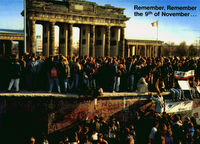The War On Terror?
President Bush talks about “The War on Terror” quite often. His critics undoubtedly know he is playing politics with the concept of terrorism; and his supporters, I can only guess, eat this up and have their love of country and flag reinforced each time he makes the point we have an enemy that “hates us for our freedoms”. And, this is all fine and dandy in the game of politics. Well, fine and dandy isn’t exactly accurate; but it is at least legal to do this even though it shows a lack of character, honesty and integrity on his part. But, now he is using “The War on Terror” to justify what are most likely illegal activities such as spying on Americans without a warrant, so it is time to set the record straight…
We are not at war with terrorism. We are, however, coincidentally still in a war/occupation of Iraq; and we have some military activity going on in Afghanistan even though that country, where Osama Bin Laden probably is hiding, has fallen so far off of the President’s plate he couldn’t find it on a map, but I digress. Back to the war on terror… It is not a real war, and The President must stop confusing a marketing slogan with the actual definition of war. There is a situation that we need to deal with regarding terrorism, and we should be allocating resources towards this, but it is a war the same way that we have a war on drugs - except for the fact that terror is actually a bad thing that should be fought against.
Or, perhaps a better analogy is The Cold War. We had a struggle against The Soviet Union that lasted almost 50 years, and they were a great concern to us over that entire time, and they required that a lot of our resources be committed towards them. We called it The Cold War, but that was just a phrase to define the struggle - it was not really a war. And, The War on Terror is not really a war. World War II was a war. The Vietnam War was a war, and even The Iraq War (if that is the name that will stick to it) is a war.
The War on Terror is a phrase that helps us easily label this struggle we are faced with. It is a struggle against an unknown number of Muslim people, who are not affiliated with any particular recognized governments, who want to influence the world through random acts of violence that we in our country cannot understand. Acts of terrorism have been going on for decades, but we chose in our own minds to take these acts seriously after Sept 11th, and to make the fight against this ideology a main focus of this country. Hence, the term War on Terror was coined to describe this new state of affairs.
But, as the president himself stated in a Today Show interview over a year ago, "I don't think you can win (the war on terror)". I disagree slightly – we may win it in 50 years or more like we did The Cold War, but I agree with him that it will not be won in two, three, or even eight years the way we could win a regular war. The reason for that is because it is not a real war; it is a concept which explains our struggle against a certain ideology, and it will take generations to defeat or change this ideology.
Therefore, it is completely illogical for anyone to suggest, as the president has, that the rules of war apply towards the war on terror, which could conceivably last for generations or forever. And, when it comes to the rule of law, we cannot bend or break these rules based on the fact that we are supposedly at war with terrorism because that might mean we are suspending these laws and some of our civil liberties forever. Likewise, we have not agreed as a nation – through the courts or the legislature - to grant any president more executive power than those already granted him by the constitution. For a president to circumvent the law and arbitrarily grant himself more executive powers based on the notion that we are at war - when we are not really at war - is tantamount to a dictatorial power grab.
If we give the president the benefit of the doubt then we can assume that it’s not his intention to seize power for himself, but rather that he actually believes he has this authority as he has been claiming in his defense. We are then faced with a case where his incompetence and dishonesty has come back to haunt us once again. He has been playing politics with “The War on Terror” for so long that he has begun to believe his own exaggerated rhetoric. If he can’t see the difference between an actual war and a struggle against an ideology that might last forever then this speaks to his inability to understand the geopolitical nature of the world. Who knows what else he has already done or might do all in the name of “The War on Terror”? So far what he has done, aside from authorizing illegal eavesdropping on American citizens without a warrant, is create a potential constitutional crisis.
We are not at war with terrorism. We are, however, coincidentally still in a war/occupation of Iraq; and we have some military activity going on in Afghanistan even though that country, where Osama Bin Laden probably is hiding, has fallen so far off of the President’s plate he couldn’t find it on a map, but I digress. Back to the war on terror… It is not a real war, and The President must stop confusing a marketing slogan with the actual definition of war. There is a situation that we need to deal with regarding terrorism, and we should be allocating resources towards this, but it is a war the same way that we have a war on drugs - except for the fact that terror is actually a bad thing that should be fought against.
Or, perhaps a better analogy is The Cold War. We had a struggle against The Soviet Union that lasted almost 50 years, and they were a great concern to us over that entire time, and they required that a lot of our resources be committed towards them. We called it The Cold War, but that was just a phrase to define the struggle - it was not really a war. And, The War on Terror is not really a war. World War II was a war. The Vietnam War was a war, and even The Iraq War (if that is the name that will stick to it) is a war.
The War on Terror is a phrase that helps us easily label this struggle we are faced with. It is a struggle against an unknown number of Muslim people, who are not affiliated with any particular recognized governments, who want to influence the world through random acts of violence that we in our country cannot understand. Acts of terrorism have been going on for decades, but we chose in our own minds to take these acts seriously after Sept 11th, and to make the fight against this ideology a main focus of this country. Hence, the term War on Terror was coined to describe this new state of affairs.
But, as the president himself stated in a Today Show interview over a year ago, "I don't think you can win (the war on terror)". I disagree slightly – we may win it in 50 years or more like we did The Cold War, but I agree with him that it will not be won in two, three, or even eight years the way we could win a regular war. The reason for that is because it is not a real war; it is a concept which explains our struggle against a certain ideology, and it will take generations to defeat or change this ideology.
Therefore, it is completely illogical for anyone to suggest, as the president has, that the rules of war apply towards the war on terror, which could conceivably last for generations or forever. And, when it comes to the rule of law, we cannot bend or break these rules based on the fact that we are supposedly at war with terrorism because that might mean we are suspending these laws and some of our civil liberties forever. Likewise, we have not agreed as a nation – through the courts or the legislature - to grant any president more executive power than those already granted him by the constitution. For a president to circumvent the law and arbitrarily grant himself more executive powers based on the notion that we are at war - when we are not really at war - is tantamount to a dictatorial power grab.
If we give the president the benefit of the doubt then we can assume that it’s not his intention to seize power for himself, but rather that he actually believes he has this authority as he has been claiming in his defense. We are then faced with a case where his incompetence and dishonesty has come back to haunt us once again. He has been playing politics with “The War on Terror” for so long that he has begun to believe his own exaggerated rhetoric. If he can’t see the difference between an actual war and a struggle against an ideology that might last forever then this speaks to his inability to understand the geopolitical nature of the world. Who knows what else he has already done or might do all in the name of “The War on Terror”? So far what he has done, aside from authorizing illegal eavesdropping on American citizens without a warrant, is create a potential constitutional crisis.





